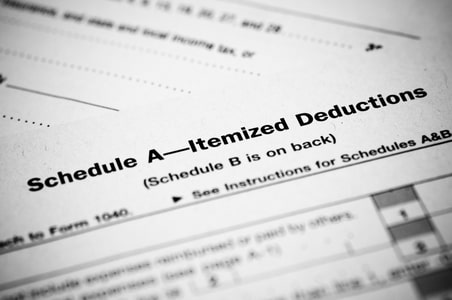 Schedule A
Schedule A
Schedule A is an attachment to Form 1040 for reporting income. It allows you to claim deductions to lower your tax liability. In this article, we will go over how Schedule A works and what you can deduct with it.
The Basics
Schedule A is an optional tax form. There are two types of deductions you can take-standard and itemized. The standard deduction is a set amount the IRS allows you to take each year to reduce your taxable income. In 2018 that amount is $12,000 for single filers or $24,000 for married filers. On the other hand, an itemized deduction is a customized amount you can choose to take. As a result, it is only advantageous to take the itemized deduction if your qualified expenses are over the standard deduction amount. There are five categories of deductions. These include:
- Medical and Dental Expenses
- Taxes
- Interest
- Charitable Donations
- Casualty and Theft Losses
Medical and Dental Deductions
For the 2018 tax year, you can deduct qualifying medical expenses that exceed 10% of your Adjusted Gross Income. Qualifying expenses include preventive care services, surgery, dental care, vision care, mental health care, prescription medication, and appliances (i.e. glasses, contacts, dentures, and hearing aids). Additionally, you can deduct medical travel expenses. This includes mileage on your vehicle, bus fare, and parking fees.
You cannot deduct any medical expenses for which you receive reimbursement through your insurer or employer. You also cannot deduct costs related to cosmetic procedures, non-prescription drugs, and general health items like toothpaste or vitamins.
Tax Deductions
You can use Schedule A to deduct certain taxes from your AGI. The taxes you can deduct are your state and local income taxes, real property taxes, and personal property taxes. In 2018 you are limited to a $10,000 deduction claim for this area. It is only $5,000 if you are married filing separately.
Interest Paid
It is possible to deduct several types of interest you have paid from your taxable income. Qualifying types of interest include mortgage interest, student loan interest, and interest on some business loans. However, you cannot deduct interest paid on personal credit cards, car loans, or other personal loans. The rules for what you can deduct vary greatly on what type of interest you are claiming.
Charitable Donations
For a charitable donation to qualify as a Schedule A deduction it must be made to an organization that is qualified by the IRS. If you gift cash, you deduct the total amount of cash donated to charities. If donate property to a charity, typically, you are able to deduct the fair market value of the property. Please note, you are limited on how much of your donations you can deduct. You are limited to deducting 50% of your adjusted gross income. For some donations, the amount is capped at 30% of your adjusted gross income.
Casualty and Theft Losses
Under new tax laws, it is only possible to deduct casualty and theft losses if they were due to a disaster that was federally declared by the President. If this is the case, you can deduct losses related to your home, household items, and automobiles.
Utilizing Schedule A
With the new tax laws, fewer people find utilizing Schedule A to be beneficial. If you are unsure if this will be helpful to you meet with your tax preparer. They can analyze your situation and let you know what choice will be the most advantageous for your situation.
Questions? Want to schedule an appointment? Contact us by clicking here.






Leave A Comment
You must be logged in to post a comment.